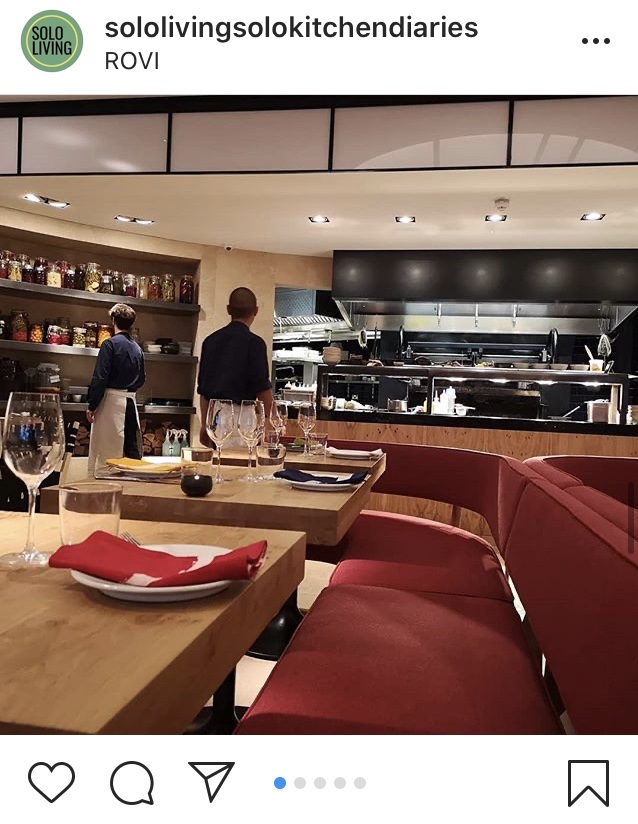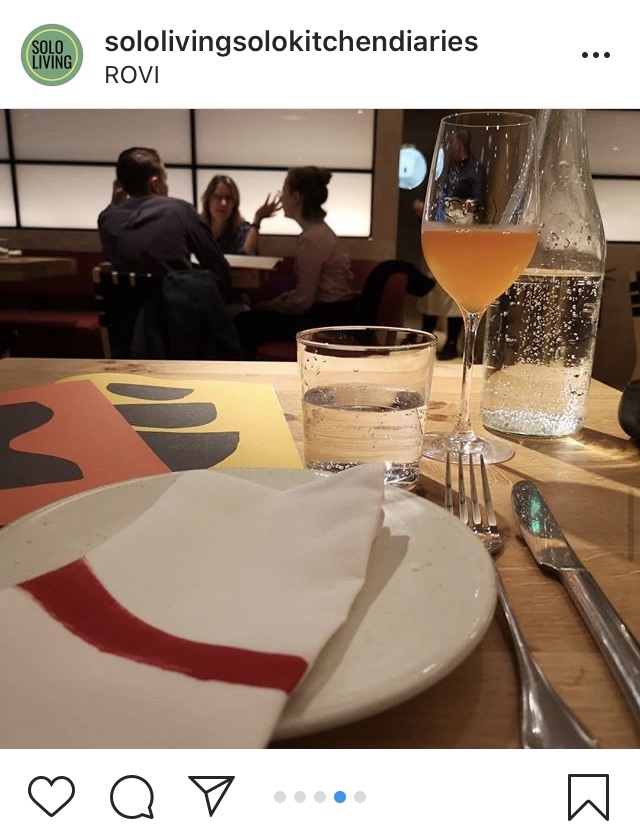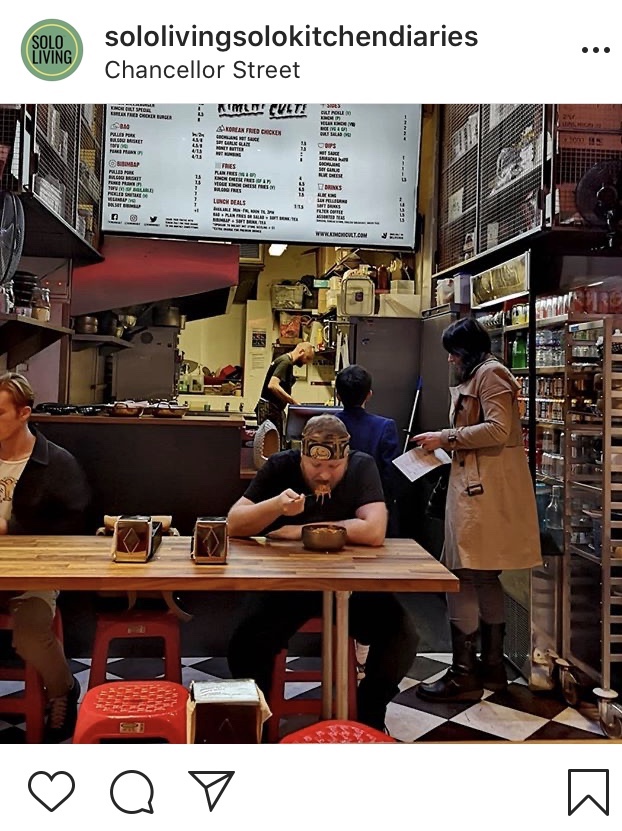I’ve been told many times by foreigners who love Japan that as a country, it might be the most prepared and advanced for solo activities, especially when it comes to food, and thanks to this interview I found it to be not entirely off the mark when it comes to the UK. In Europe, eating alone is seen as strange or lonely. We talked to Sucheta, founder of the online media and community “Solo Living,” which was launched three years ago to convey the joys and wonders of living and eating alone in the UK.
――Upon my research it seems you started Solo Living in 2017. What was your inspiration and motivation to start Solo Living?
Solo Living:I had reached my early 30s and was single. Everyone around me was coupling up, settling down and getting married. I never really felt the drive to settle down, thinking it would just happen for me. Being in a relationship wasn’t out of the question, but it wasn’t a goal either. I know now you have to put the same kind of energy into finding a partner as you would do for a dream job. Although I did realise I had a lot in my life to be grateful for, and my life was good living alone. I was in no rush to change my relationship status and surprised myself. No one was talking about living alone. The conversation hadn’t started. It took a long time before I felt the time was right to set up Solo Living because as much as I enjoyed living alone; for many years single life and living alone had negative connotations. Thankfully, things are changing.
――What is the age-range of your readers? If you have wide age-ranging readers, are there any generation age gaps of living a solo lifestyle?
Solo Living:Our readers span across different age groups, but I would say our core readers are aged 34 plus. Most people living alone are older mid-lifers here in the UK, but certainly, younger people are having the chance to live alone and many through choice. Living alone is probably least prevalent amongst 18-24-year-olds who will often live at home with parents or in a house share. Saying that living alone isn’t just about living alone in your own home, as we welcome people living in house shares and single parents in our online communities. We regard Solo Living as a platform for people navigating life solo – carrying the mental load of life on their own – making important decisions for themselves without a partner or being able to share every decision with a partner, friends or a family member.
――How do you feel reflecting back to when you first started Solo Living? Was there a strong and growing reader base from the very beginning?
Solo Living:It’s taken time to build a readership for Solo Living. Talking about living alone and how to present it positively without ignoring the challenges meant from day one, every piece of content was important. Neither is it easy to set up and build a community online these days. I think we have the combination of living alone, wellbeing and sustainable living on the right track now and our readership has grown fastest over the last year. Looking back, I’m incredibly pleased with the direction we’re going in. I feel there is still a lot to do and many conversations to be had around living alone so, in many ways I think we’re just getting started!
――It is evident that your media content from your Solo Living writers is very informative and keeps with your mission and brand values. What are some of the things that have changed in your Solo Living Community during the last three years? Because of your movement, do you feel that you have influenced many people to transition to doing more alone time activities?
Solo Living:My hope is that we encourage Solos to be happier and content in their time spent living alone. To make the most of the freedom and opportunities living solo can bring. To accept living alone can be a good lifestyle choice, even on a temporary basis and for people to feel as though they are not missing out. We also think it is vital to have a good relationship with yourself and have a greater awareness of one’s self. We want Solos to live well while they are living alone, and that’s why we promote sustainable living and self-care. To answer your question about what has changed, I would say we are helping with wider societal acknowledgement and acceptance of people living alone and that Solos have a voice. We are here to talk about all aspects of living alone by positioning ourselves in the normality of everyday life. We’ve noticed that we are inspiring other Solos to talk more widely on social media about their Solo Living experiences which makes us happy.
――During the last ten years, being alone has become more popular, and for some, it has become a “civil right” in Japan. Some restaurants, cafes and hotels provide specialized services for a party for one. How about in the UK? Are there any specialized services for a party for one?
Solo Living:I wouldn’t say we are culturally in the moment of accepting being alone as a ‘civil right’, here in the UK. We’re nowhere near anything like that at all. That being said, it is more acceptable to live alone today than it has been in previous decades – purely because more people are living alone than ever before. A third of households comprise of one person in the UK and some European countries. In Scandinavian countries, the figure is nearer 1 in 2 households. It means more of us are likely to know or have friends and family who are living alone. The acknowledgement contributes to wider acceptance of living alone as a lifestyle.
We still have a long way to go to cater to Solos in the marketplace, although advertisers are showing more Solos in their campaigns. I think Japan is much more forward-thinking in catering for Solos. Dining out alone is yet to be a norm over here, although it is more prevalent in cities like London and Glasgow, where grabbing lunch or a quick dinner alone is catered for in cafes and many restaurants. A few restaurants are making it easier to dine solo and in different ways; but dining solo is not a culturally accepted norm as yet. It also depends where you live. You’re more likely to see solo diners in a busy city rather than remote rural areas. It is rare to see a Solo dining out alone in the evening or making an event of going to a restaurant at night time. Hotel rates here, tend to be the same whether one or two people stay in a room which is an issue for many solo travellers. We have noticed the occasional event and stay packages geared towards Solos but not to the same extent as what is available in Japan by the sound of things.
――In your website, author Ciara McArdle said, “Women aged between 35-44 and 50 and over who have opted to take some ‘me’ time on vacation”. How about the younger generations, are they also travelling alone? For example, in Japan, young people are travelling alone (Gen Z and Millennials) more than any other generations, regardless of sex.
Solo Living:I think more young people are becoming confident about travelling alone and backpacking in particular. Asian countries prove to be the most popular destinations for solo travellers. Being able to stay connected with friends and family while away means travelling alone doesn’t have to lonely. Affordability and time is another factor, as is designing a bespoke holiday that genuinely caters for individual needs. Here, women are opting to travel Solo as a way of getting some high-quality ‘me-time’ and taking a break from the norms of everyday life. Often the reason is the difficulty of being able to schedule holiday time with family and friends. There’s also the consideration of not being restricted by another person when travelling solo, which means ticking things off your bucket list is easier. It seems people in Japan are more confident and happy to be living alone and travelling solo from a young adult age compared to the UK and Europe. The trend is interesting.
――In your website, the title “Table for One? Yes please” indicates that many restaurants are offering long benches, communal tables and window seating for the solo diner in the UK. When did this take shape and what caused these types of logistical changes?
Solo Living:Probably in the last five years. It comes with the more general trend of dining out becoming more of a social and casual experience than it was before. Whether you are solo or not, it is easier to pop into a cafe and restaurant and have a quick, relaxed bite to eat and many people prefer to have a drink while they are eating rather than going to the pub. However, some of our members have commented on restaurant experiences where they have felt unwelcome; when staff have embarrassed them because they are dining alone. Clearly, going to formal, family, or romantically oriented restaurants is not a good idea for Solos unless staff truly welcome and treat them well from the moment they walk in the door. We are paying customers just like everyone else. Much of the Solo dining experience depends on the service received by restaurant staff and how well Solos are treated as guests. Good restaurants will know the best table in their restaurant for Solos to feel comfortable, whether it be at the bar where you can chat to staff and other diners or beside a window where you can people-watch at the same time. The very best places will let you choose where you want to sit. I guess no-one has really figured out the business model or viability for creating restaurants that cater specifically for solo diners. Although some high street cafes open during the day make eating lunch alone very easy. Saying that, whether there would be enough trade to build a restaurant around Solos is yet to be established here in the UK.
――It seems for men, the table for one situation is perceived to be normal from a social perception from many years ago. However, for women, it may be perceived to be somewhat negative. Would you agree or not?
Solo Living:I certainly know more men than women who go out on their own to a bar or restaurant in the evenings. I think it’s getting easier for women to eat out alone. Working women and women taking a solo holiday often have to, if they are away on business or staying at a hotel. I think it’s down to having the confidence to eat out alone. Having an interest in food helps. If dining solo is what you want to do – male or female, then choose a place that serves good food and where the staff are going to treat you well.
――On your Instagram, there are so many attractive looking food pictures. Who makes these dishes? Do you have any cooking advice or techniques for alone cooking as I don’t see that on your Instagram pages?
Solo Living:I make all the food posted to our Instagram page unless I’m posting about eating out or ordering takeaway, of course! I have plenty of tips for cooking for one but too many to share here. It has taken a long time to get used to cooking for one because I was brought up on great home-cooking made for a family. The most important advice I can give to Solos when cooking for one is to eat well, healthily and make eating at home a joy. Cooking for oneself is a pleasure and a way to decompress at the end of a busy day. It’s something you can do to keep yourself occupied and use the time to mull things over. It’s also a great way to learn something new and build your skills in the kitchen. I have had many moments in the kitchen when I’ve tried to recreate a dish from a restaurant or cook with high-quality ingredients. Giving time and preparing good food for yourself adds to the positive living alone experience. Solo Living also has a Facebook Group called Solo Dining and a Table for One with over 800 members where we share inspiration and cooking tips. As a member of the group, you don’t feel like you are eating alone because everyone is sharing photos of their food and telling stories of their day.
――Are there any unique solo lifestyle trends in your community and the UK?
For example, in Japan, solo camping has been a huge trend over the last few years. Many people enjoy their Alone time in nature.
Solo Living:Solo dining and solo travel are probably the most prevalent trends accompanied by, and as a consequence of, living alone. We have recently published an article about the Solo Bikepacking trend, which seems to be growing in popularity in Europe. It’s an easy way for Solos to take a break and travel, particularly during a pandemic. I think solos in the UK value their alone time and most importantly, their home, where they will spend hours at a time and will enjoy their home in a way that is different from others. Home is a sanctuary for Solos. I think a trend would be Solos finding it essential to stay socially connected with friends and family while leading independent lives.
Solo Living
Sucheta Dutt is the Founder of Solo Living and has been living solo for many years.Born in 2017, Solo Living is a Glasgow-based online magazine and community dedicated to sharing the experience of living alone and supporting sustainability and self-growth. Solo Living has now become a hub for all communities regarding solo activities where people can talk about the joys and problems of living alone, create opportunities, and give advice. In Facebook’s membership-based group “Solo Dining & Table for one,” more than 800 members share their experiences and information on the matter.
Picture Provided official Instagram of SoloLiving SoloKitchen Diaries (@sololivingsolokitchendiaries)
Tranlation Leandro Di Rosa








